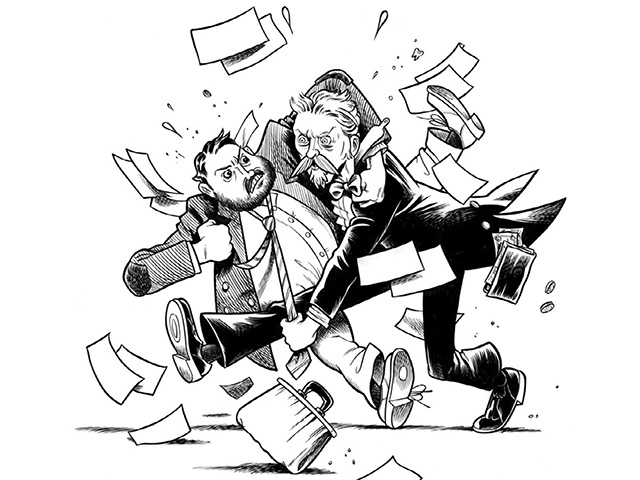NC Museum of Natural Sciences researcher delves into Edward Drinker Cope’s final feud
For immediate release ‐ October 03, 2016
Contact: Jon Pishney, 919.707.8083. Images available upon request

Cope vs. Frazer, drawn by Zander and Kevin Cannon of Big Time Attic.
RALEIGH — A notoriously combative Quaker naturalist, Edward Drinker Cope relished a good fight. His infamous quarrel with Yale paleontologist, Othniel Charles Marsh, which climaxed in 1890 when it became front-page fodder for the New York Herald, was one of the great scandals of nineteenth-century American science. But it was not his last. New research by North Carolina Museum of Natural Sciences science historian Paul Brinkman takes a closer look at Cope’s final feud, this time with Chicago’s Field Columbian Museum and its embattled director, Frederick J.V. Skiff. Brinkman’s findings were published in Archives of Natural History in October.
“Cope’s once prodigious vertebrate paleontology research program was in tatters by the 1890s,” Brinkman notes. “Marsh’s many triumphs had demoralized him, while a ruinous succession of unlucky mining investments had depleted his family fortune. Cope, the quintessential gentleman-naturalist, was compelled to pawn his fossil collections and seek a paying position in a university or museum. Unfortunately, he lacked the tact and the proper temperament to adapt himself to an increasingly professionalized American scientific establishment.”
Instead of adapting, Cope turned his rancor toward Skiff, a businessman who had no scientific training and no formal museum experience yet was hired to direct the newly opened Field Museum in 1894. In caustic editorials appearing in the American Naturalist, Cope wrote, “… in Europe competent scientific men manage museums; in America, they do not … Chicago begins, in this matter, at the bottom of the ladder.” And later, “Men who have spent their lives in mercantile pursuit are generally unacquainted with the conditions necessary to original research in science.”
Yet America’s new, urban, natural history museums — lavishly funded by philanthropists like Marshall Field — provided a clearer career path and better professional opportunities for collections-based scientists. “The unfortunate flipside to better professional opportunities was the concomitant loss of freedom,” Brinkman concludes. “A scientist working in the private research museum context would now have to answer to museum patrons or their representatives — despite their lack of scientific credentials and their non-scientific motivations. This was something that a stubborn, strong-willed gentleman-naturalist like Cope simply could not abide. Ultimately, he could not or would not adapt himself to the increasingly institutional and professional American scientific establishment.” Cope died in 1897.
A short video summarizing Brinkman’s research can be viewed here:

